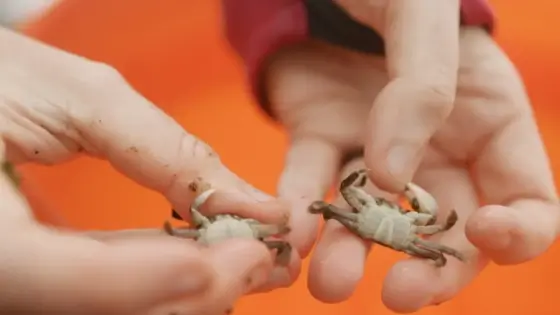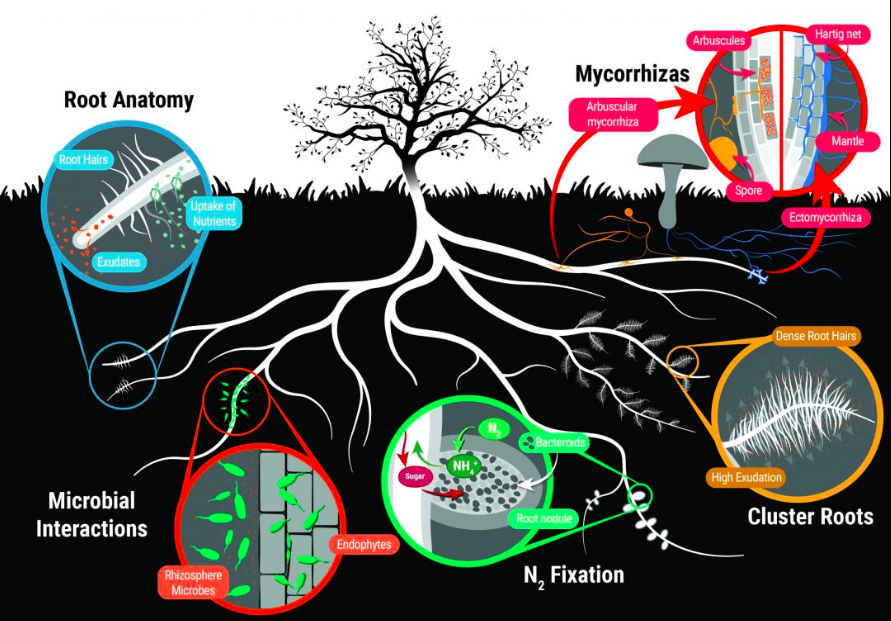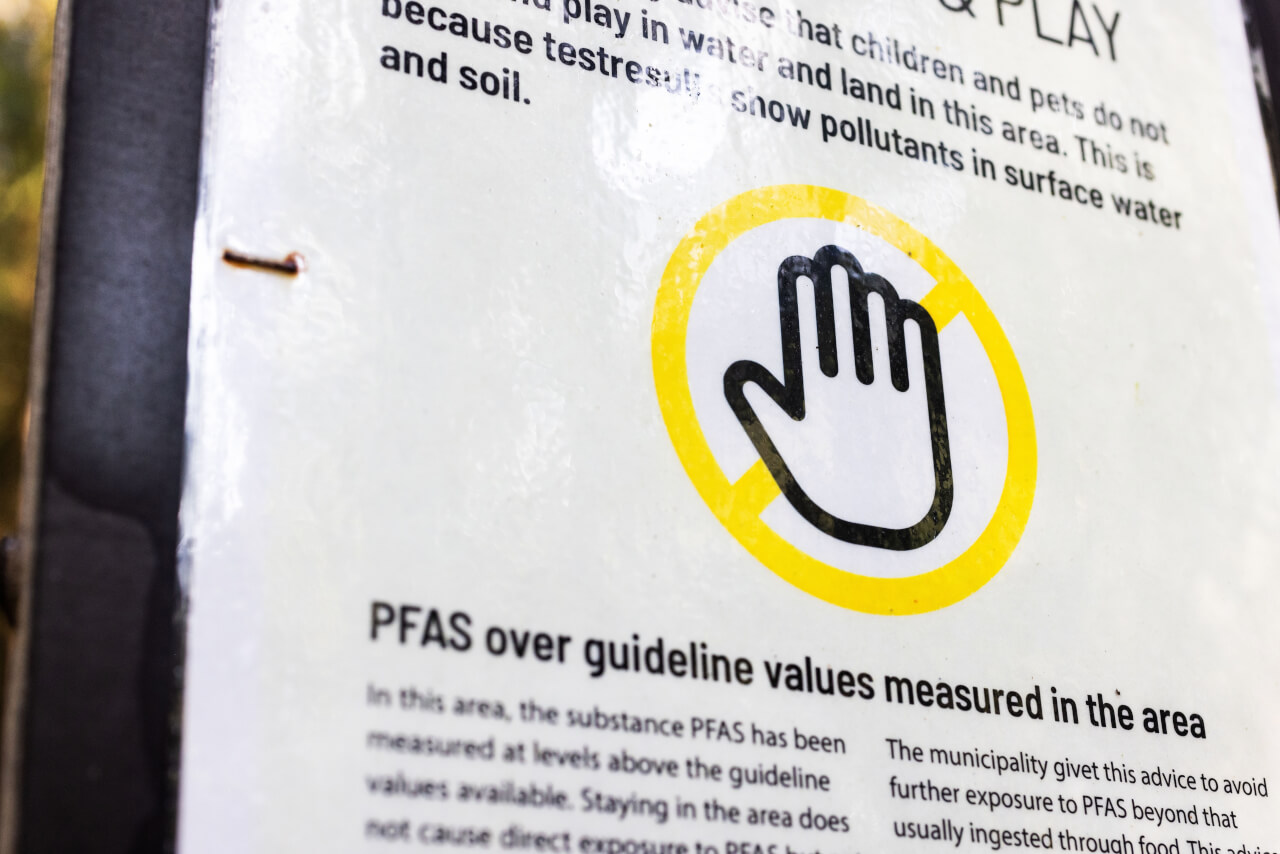[ad_1]
Non Needed cookies to view the content material.” data-cli-src=”https://www.youtube.com/embed/uBqIZa3eCwM?si=xo0Wvf1Te2Z5oKeF” width=”560″ top=”315″ frameborder=”0″ allowfullscreen=”allowfullscreen”>
When Chelsea Wooden was a baby, she would typically acquire Periwinkle snails on the shores of Lengthy Island.
“I used to pluck them off the rocks and put them in buckets and preserve them as pets after which re-release them,” Wooden mentioned. “And I knew that species very well.”
It wasn’t till years later that Wooden discovered that these snails have been teeming with parasites.
“In some populations, one hundred pc of them are contaminated, and 50 p.c of their biomass is parasite,” Wooden mentioned. “So the snails that I had in my bucket as a baby have been not likely snails. They have been principally trematode [parasites] that had commandeered snail our bodies for their very own ends. And that blew my thoughts.”
Wooden, now a parasite ecologist on the College of Washington, generally refers to parasites as “puppet masters,” and in lots of circumstances, it’s not an exaggeration. Some can mind-control their hosts, for instance, inflicting mice to hunt out the scent of cat pee. Others can shape-shift their hosts, bodily altering them to appear to be meals. And their ripple results can reshape complete landscapes.
For hundreds of years, folks have considered parasites as nature’s villains. They typically infect folks and livestock. In truth, parasites are by definition dangerous for his or her hosts, however in the present day, extra scientists are beginning to consider parasites as forces for good.
“I don’t suppose anybody is born a parasitologist. Nobody grows up wanting to check worms,” Wooden mentioned. “Someplace alongside the way in which, I wish to say, they received underneath my pores and skin. I simply fell in love with them. I couldn’t consider that I’d gotten that far in my biology schooling and nobody had ever talked about to me that parasites are extremely biodiverse, ubiquitous, all over the place.”
On a cloudy August morning, Wooden took me to Titlow Seashore in Washington state, one among her group’s analysis websites. Again within the Nineteen Sixties, one among Wooden’s analysis mentors had sampled shore crabs right here. On the time, the realm was very industrial and closely polluted. However when researchers, together with Wooden, got here again to gather samples half a century later, the seashore had remodeled. The water was cleaner and the shorebirds had returned, however these weren’t the one promising indicators: The crabs have been now filled with trematode worms, a kind of parasite that jumps between crabs and birds.

Chelsea Wooden kneels to seek for shore crabs at a seashore in Tacoma, Washington. She’s going to later dissect the crabs to seek for parasites. Jesse Nichols / Grist
The parasites have been an indication that the native shorebirds have been doing nice, Wooden defined.
As scientists have discovered extra about parasites, some have argued that many ecosystems may really need them with a view to thrive. “Parasites are a bellwether,” she mentioned. “So if the parasites are there, you realize that the remainder of the hosts are there as nicely. And in that approach they sign in regards to the well being of the ecosystem.”
To know this counterintuitive concept, it’s useful to have a look at one other class of animals that folks used to hate: predators.
For years, many communities used to deal with predators as a form of vermin. Hunters have been inspired to kill wolves, bears, coyotes, and cougars with a view to defend themselves and their property. However finally, folks began noticing some main penalties. And nowhere was this phenomenon extra obvious than in Yellowstone Nationwide Park.
Within the Nineteen Twenties, grey wolves have been systematically eradicated from Yellowstone. However as soon as the wolf inhabitants had been eradicated from the park, the variety of elk started to develop unchecked. Ultimately, herds have been overgrazing close to streams and rivers, driving away animals together with native beavers. With out beavers to construct dams, ponds disappeared and the water desk dropped. Earlier than lengthy, the complete panorama had modified.
Within the Nineties, Yellowstone modified its coverage and reintroduced grey wolves into the park. “When these wolves got here again in, it was like a wave of inexperienced rolled over Yellowstone,” Wooden mentioned. This story turned one of many defining parables in ecology: Predators weren’t simply killers. They have been really holding complete ecosystems collectively.
“I feel there’s loads of parallels between predator ecology and parasite ecology,” Wooden mentioned.
Like the grey wolves in Yellowstone, scientists are simply beginning to acknowledge the profound ways in which ecosystems are formed by parasites.
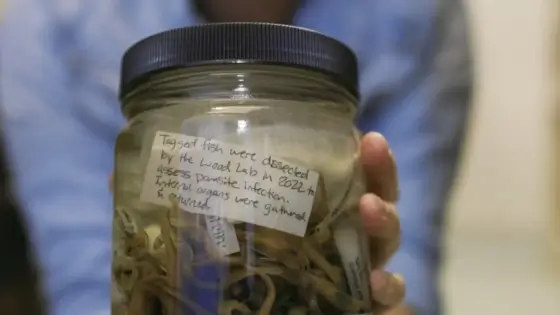
Chelsea Wooden holds a jar of fish that her lab dissected for a examine printed in 2023. Jesse Nichols / Grist
Take, for instance, the connection between nematomorphs, a kind of parasitic worm, and creek water high quality. The worms are born within the water, however spend their lives on land inside bugs, like crickets or spiders.
On the finish of their lives, nematomorphs want to maneuver again to the water to mate. As a substitute of constructing the damaging journey themselves, they trick their contaminated hosts into giving them a journey by inducing a “water drive,” an impulse on the a part of its insect host to immerse itself in water. The insect will transfer to the sting of the water, think about it for a short while after which leap in — to its personal loss of life, however to this parasite’s profit.
The story doesn’t finish there. In a approach, the complete creek ecosystem depends on a worm making an attempt to hitch a journey to the water. Fish eat the bugs that throw themselves within the water. In truth, one species of endangered trout will get 60 p.c of its weight loss program solely from these contaminated bugs. “So primarily, the parasite is feeding this endangered trout inhabitants,” Wooden mentioned.
With much less of the menace related to hungry fish, the native bugs within the stream can thrive, consuming extra algae and thereby giving the creek clear water.
Parasites make up an estimated 40 p.c of the animal kingdom. But, scientists know subsequent to nothing about thousands and thousands of parasite species around the globe. The primary parasites that scientists have spent loads of time finding out are those that infect cattle, pets, and other people.
Many of those alarming parasites, like ticks or the parasitic fungus that causes Valley Fever, are anticipated to extend as a consequence of local weather change. However nobody really is aware of what local weather change means for parasites, broadly — or how any large change in parasites may reshape the world. “There’s this basic sense that an infection is on the rise, that parasites and different infectious organisms are extra frequent than they was,” Wooden mentioned. “A minimum of for wildlife parasites, there actually isn’t long-term knowledge to inform us whether or not that impression that we now have is actual,” Wooden mentioned. “We needed to invent a strategy to get these knowledge,” Wooden mentioned.
Wooden had an unconventional concept of the place to look: a set of preserved fishes locked away in a museum basement.
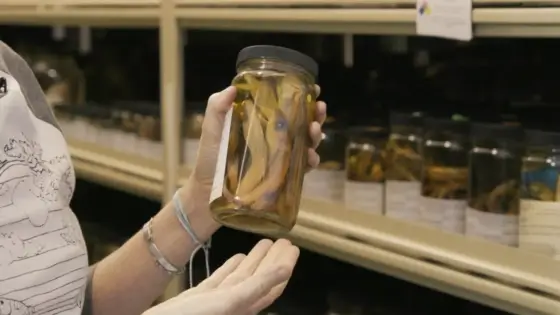
Chelsea Wooden holds a jar of preserved fish from the College of Washington Fish Collections. Jesse Nichols / Grist
The College of Washington Fish Collections is dwelling to greater than 12 million samples of preserved fishes, relationship all the way in which again to the 1800s. However the hundreds of jars lining the gathering cabinets additionally comprise one thing else: all of the parasites residing contained in the fish samples.
“A lot has been found from museum specimens that we tucked away at one time, after which pulled off the shelf 100 years later,” mentioned Wooden. “It’s actually exceptional to get to see again in time the way in which that you simply do whenever you open up a fish from 100 years in the past. It’s the one approach that we’ll know something about what the oceans have been like, parasitologically, that way back.”

Chelsea Wooden dissects fish samples in her lab on the College of Washington. Jesse Nichols / Grist
Wooden and her group spent over two years opening up jars and surgically dissecting the parasites from inside. Below microscopes, they recognized and counted the parasites earlier than returning all the things for future examine. In the long run, they discovered greater than 17,000 parasites.
Trying on the variety of parasites present in fishes over time, the researchers discovered a mixture of winners and losers, however there was one large class of parasites that was unequivocally declining: complicated parasites, the varieties that want a number of completely different host species with a view to survive. That kind of parasite declined a mean of 10 p.c every decade, the group discovered.

Jesse Nichols/Grist
In Wooden’s investigation, there was just one issue that completely defined the decline in parasites: It wasn’t chemical substances or overfishing. It was local weather change. It made loads of sense: Complicated parasites can solely survive if everybody a kind of host species are round. If only one kind of host goes lacking? “Recreation over. That’s it for that parasite,” Wooden mentioned. “That’s why we predict that these complicated life cycle parasites are so susceptible: as a result of issues are shifting, and the extra factors of failure you have got, the likelier you might be to fail.”
Wooden mentioned that, earlier than this examine, researchers had no concept local weather change was wiping out this vital class of parasites.
“It’s doubtless a collateral impression,” she mentioned. “We don’t actually have a deal with on what number of parasites there are on the planet, a lot much less the size of parasite biodiversity loss proper now. However the early indications are that parasites are not less than as susceptible as their hosts, and probably extra susceptible.”
Wooden says that it’s vital for folks to know that parasites play large and complicated roles in nature, and if we ignore what we are able to’t see, we threat lacking out on understanding how the world actually works. “All of us have a reflexive distaste for parasites, proper? We take medicine, we apply chemical substances, we spray, Wooden mentioned. “Our argument is that parasites are simply species. They’re a part of biodiversity, and so they’re doing actually vital issues in ecosystems that we rely upon them for.”
This text initially appeared in Grist at https://grist.org/video/parasite-climate-change-ecosystem-health-science/. Join Grist’s weekly e-newsletter right here. Grist is a nonprofit, unbiased media group devoted to telling tales of local weather options and a simply future. Study extra at Grist.org
[ad_2]
Source link

